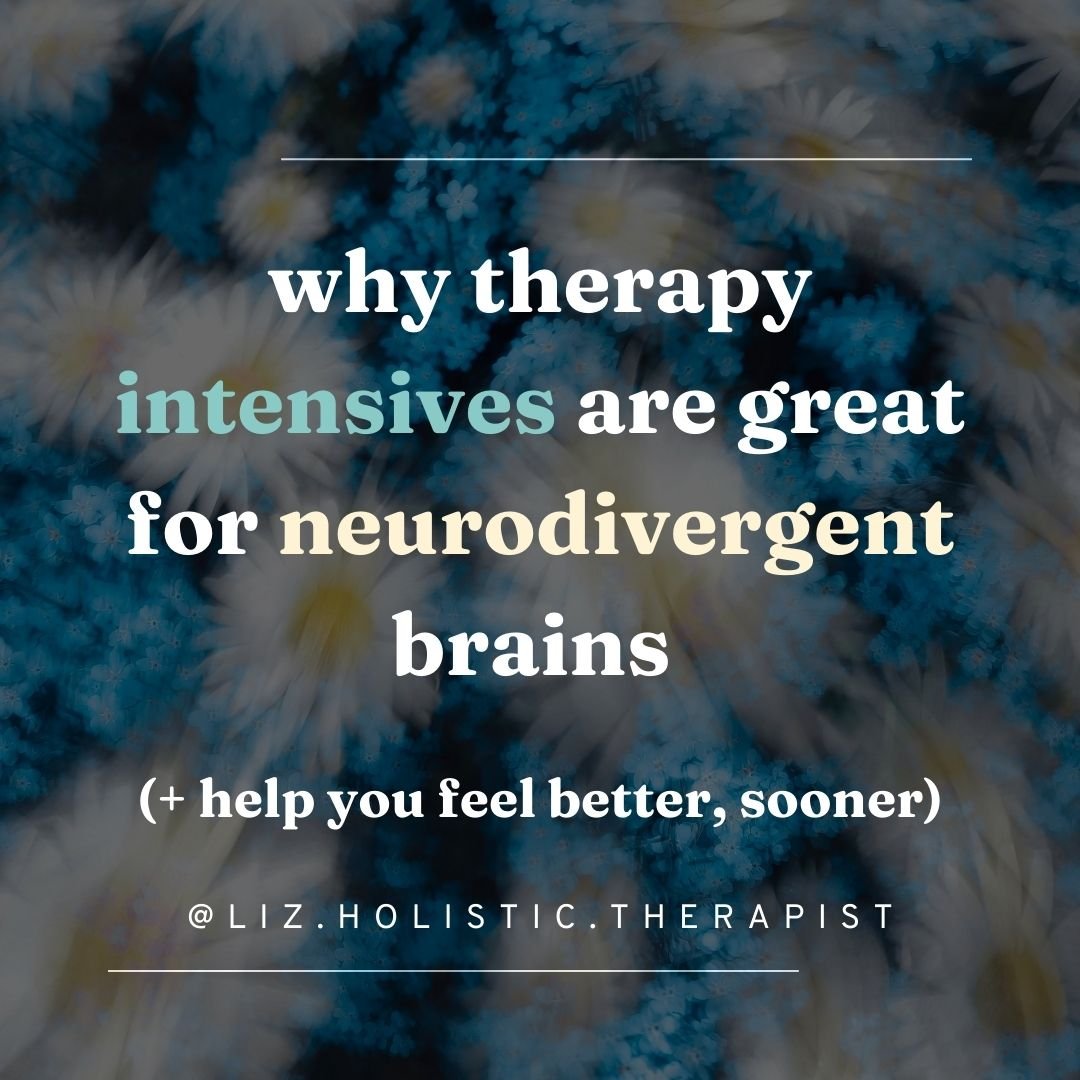Liz Zhou
Holistic Trauma Therapist, Coach, Speaker
Helping highly sensitive, neurodivergent adults & couples.
BLOG
How to Recover from Autistic Burnout: 5 Types of Rest
Feeling like you’re running on empty? Learn about autistic burnout and how to manage it. We’ll explore different types of rest needed for recovery — from sensory breaks to social boundaries — providing actionable strategies to restore your energy.
For Highly Sensitive, Neurodivergent Adults: 4 Things Making Your Sensory Overload Worse
Constant overstimulation, burnout, and meltdowns don’t have to be your norm. A neurodivergent therapist shares 4 simple changes that can help you regulate your nervous system and develop a flexible capacity to handle stress.
For Neurodivergent Adults: 6 Creative Ways to Regulate Your Nervous System
Many neurodivergent adults (autistic, ADHD, highly sensitive) experience emotional intensity, sensory overload, and social challenges that dysregulate their nervous systems. This blog post explores 6 unique ways ND folks can care for their nervous systems through sight, sound, taste, smell, touch, and the crucial practice of taking breaks from sensory input.
How Do I Know if I’m Neurodivergent? | The Umbrella of Neurodivergence
Explore the broad spectrum of neurodiversity, from innate neurodivergence like autism, ADHD, and high sensitivity; to acquired differences resulting from trauma and other experiences. We’ll explain why both formal diagnoses and self-diagnosis are valid; and why there is no such thing as a 100% neurotypical person.
EMDR vs. Brainspotting: Which is Better for Neurodivergent Brains?
EMDR and Brainspotting offer unique approaches to brain-body healing. Discover which therapy might be a better fit for you based on factors like structure, flexibility, and session frequency (weekly vs. intensive).
For Late-Diagnosed Autistic Adults: 3 Affirming Reminders on Your Unmasking Journey
You are not broken. Your goal doesn’t have to be to fully unmask all the time, if you don’t feel safe or ready to do so. And you don’t have to magically “know” yourself post-diagnosis/discovery of your autism.
Why Therapy Intensives are Great for Neurodivergent Brains
If you’re neurodivergent (autistic, ADHD, highly sensitive) and traditional therapy hasn’t quite worked for you, a therapy intensive could be a helpful alternative. Intensives are a form of short-term, accelerated therapy, using powerful modalities like Internal Family Systems, Brainspotting, and EMDR to heal the nervous system.
Healing Complex Trauma as a Neurodivergent Person
Let’s explore the 4 phases of CPTSD recovery. Here’s why you might feel worse before you feel better, and why you might feel more neurodivergent (more autistic, more ADHD) as you heal from complex trauma.
Unmasking Autism: 6 Common Experiences of Late-Diagnosed Autistic Women
Many women discover their autism later in life. This delayed diagnosis is often due to societal misconceptions, gender bias, and the tendency to mask autistic traits. Let’s explore the common experiences of women who’ve been labeled “quiet,” “shy,” “sensitive,” and “different.”
EMDR Therapy for Autistic Adults | A Neurodiversity-Affirming Perspective
Is EMDR therapy for autistic people different than EMDR for non-autistics? The answer is more complicated than you might think. An autistic therapist shares how neurotypes influence the way that we process trauma — and why EMDR can be a great fit for neurodivergent brains.
What is Neurodiversity-Affirming IFS Therapy?
Learn why Internal Family Systems therapy can be a great fit for neurodivergent people (Autistic, ADHD, HSP) seeking to heal trauma, unmask, and connect with their authentic selves. A neurodivergent therapist explains how IFS works.
“Autistic Person” vs “Person with Autism”: What’s the Difference? | A Neurodivergent Therapist’s POV
As the mental health field updates its understanding of autism to be more affirming, more and more adults are realizing that they’re autistic – leading to a growing community of late-diagnosed neurodivergent people. Let’s explore the difference between identity-first and person-first language, and why many members of the Autistic community prefer identity-first language.
The Link Between Trauma and Neurodivergence
There’s a reason why autistic, ADHD, and other neurodivergent people tend to experience higher rates of anxiety, depression, PTSD, and complex trauma. Let’s explore how stigma, misunderstanding, and lack of accommodations in our neurotypical society impact mental health — and what we can do about it.
How to Reduce Driving Anxiety: A Holistic Guide for Highly Sensitive People
Do you avoid driving, or feel overwhelmed by the thought of it? Explore HSP-friendly strategies to make driving more tolerable (and even enjoyable).
Why Talk Therapy Isn’t (Always) Helpful for Neurodivergent People (+ What to Try Instead)
Let’s face it: traditional talk therapy wasn’t designed with neurodivergent brains in mind (autism, ADHD, high sensitivity). If you’re feeling stuck or unheard, consider alternative approaches like EMDR, IFS, and psychedelic therapy.
6 Objects That’ll Make Your Life Easier as a Highly Sensitive, Neurodivergent Person
Sensory overload is a common challenge for highly sensitive and neurodivergent nervous systems. Discover how a few simple tools, from noise-canceling headphones to fidget toys, can create a calmer and more comfortable world for you.
Psychedelic Therapy for Highly Sensitive People: 3 Things to Consider
Here’s how to plan a psychedelic experience that works with the wiring of your sensitive nervous system. Learn how to minimize overwhelm and maximize healing benefits.
How to Cope with Sensory Overload: A Guide for Highly Sensitive People
Does the world feel too loud, too bright, and too chaotic for your highly sensitive nervous system? Explore 5 skills to decrease overwhelm and calm your mind.
How EMDR Therapy Helps Highly Sensitive People Heal
Your brain and body are wired for healing. Here’s how EMDR therapy can work with your sensitive qualities to enhance your wellbeing.



















